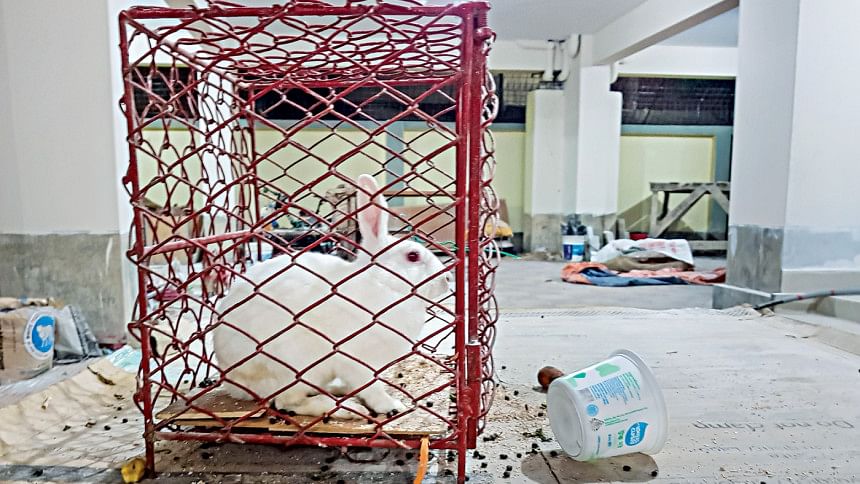Pets Aren’t Social Media Accessories

The demand for Scottish Fold cats, a breed once popular in the 1970s, saw a resurgence in the breeding market after being extensively photographed in the arms of singers Taylor Swift and Ed Sheeran, as well as actors Kirsten Dunst and Patrick Dempsey.
There is also Maru, the famous Scottish fold cat from Japan, who is in the ranks of "internet's most popular cats" with videos that have raked in more than 300 million views in total. In the words of Gudrun Ravetz, president of the British Veterinary Association, the breed's popularity largely revolves around people finding the cats to be "cute" and thus, "instagrammable".
What people went on to disregard is the price these cats have to pay for that very cuteness.
The Scottish fold cat's most distinguishable physical feature is their tiny ears which appear to be folded over. As adorable as these floppy ears are, they're the result of a painful genetic mutation that causes the cats to possess deformed cartilage. Long-term side effects of having such deformed cartilages include leading a low-quality, painful life and developing incurable variants of arthritis.
Taking into account the severity of the genetic disorder, UK's Governing Council of the Cat Fancy (GCCF) permanently halted the registrations of Scottish folds in the 1970s. Despite the ban, the Scottish fold breed eventually found its way to the US, where it gained enough popularity to prompt breeders to open up shop once more.
The cruel usage of Scottish fold cats as props on social media isn't the only case of animal cruelty that has been swept under the rug for the sake of internet fame. In the name of entertaining viral videos, irresponsible pet owners have often resorted to putting their pets in harm's way so as to boost their online presence.
In 2019, #putitinabun became a trending TikTok challenge which required pet owners to tie their pets' ears together with tight hair bands. The shameless depiction of animal cruelty in this challenge posed major health risks to the helpless animals in question, all of whom were being abused to the point of their blood vessels getting ruptured.
In the most recently-documented case of animal abuse being sidelined on social media, TikTok user @mafishguy posted a video of himself tickling a stingray that'd been lifted from its aquatic habitat. The video went viral for the wrong reasons as the viewers mistook the stingray's state of distress for one of joy.
According to the programs director of World Animal Protection USA, Ben Williamson, the stingray in the video was "suffocating to death" as a result of being exposed to a non-aquatic environment where there's no water to draw oxygen from.

Internet personalities here in Dhaka too have often contributed to normalising the toxic practice of importing exotic pets from abroad, namely Alaskan Malamutes, Huskies, and Maine Coons. The animal export business is highly unethical to say the least, as it's sole focus is centered on the maximisation of profits at the expense of the animals' safety and well-being.
When it comes to the aforementioned breeds, their physical attributes are strictly adapted to cold temperatures in coastal areas -- a stark contrast to the heat and humidity in Dhaka. Animal breeders tend to offer half-baked explanations to justify their inhumane trade. Excuses provided for unethical breeding often involve the prolonged usage of air-conditioning as a "substitute" for cold climates, and selective breeding to reduce prevalence of hereditary disorders, neither of which are feasible measures.
In July 2021, several local news portals brought to light the alleged wrongdoings of Tapashi Das, the woman behind Puchi Family on YouTube and Facebook. The CEO of Bangladesh Cat Fanciers Society, Sarah Binte Zaman, and Dipanwita Ridi of ALB Animal Shelter, accused Das of mistreating her pet cats for the sake of keeping her followers entertained on social media, while milking her cats' online presence for money.
The allegations against Das are evident in her many posts and videos where she can be seen forcefully pulling her cats' tails, bathing her cats with detergent soap and cold water, and holding her cats inappropriately enough to cause them distress. The only thing more atrocious than Das' actions is the positive audience reception to her problematic videos.
Facebook page Bambi- the mango operates as an online-based animal rescue service, primarily focused on various species of birds. When putting up adoption posts for injured birds, founder Neha Zaman often asks if the adopter in question is willing to care for the rescued birds according to their special needs. This is a question which just about every potential pet adopter should ask themselves, but often don't.
People lean towards overestimating their animal adoption capabilities just so that they can have a pet as a prop for trendy Instagram photos or viral TikTok videos. Is that all an animal's life is worth to you? A handful of likes and shares?
Rasha Jameel is your neighbourhood feminist-apu-who-writes-big-essays. Remind her to also finish writing her bioinformatics research paper at [email protected]

 For all latest news, follow The Daily Star's Google News channel.
For all latest news, follow The Daily Star's Google News channel. 



Comments